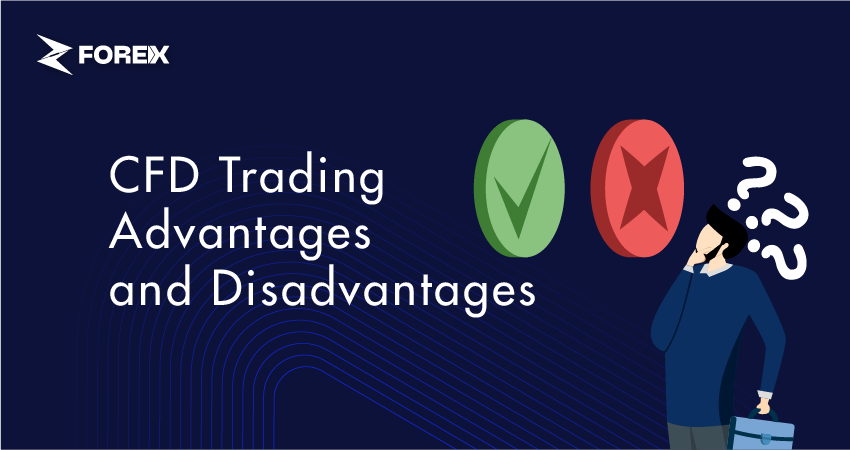
CFDs, or Contracts for Difference, are a popular derivative financial product that allows traders to speculate on the price movements of various underlying assets without owning the assets.
This trading method offers several benefits, such as enhanced leverage and access to multiple markets, but it also comes with its own set of risks and complexities. In this article, we will explore the key advantages and disadvantages of CFD trading to help traders make informed decisions.
CFD trading offers several notable benefits that make it an attractive option for many traders. Here are the key advantages:
Now let's take a look at these advantages in more detail.
One of the primary benefits of CFD trading is the availability of leverage. Leverage allows traders to control larger positions with a smaller amount of capital. This means that potential profits can be magnified, leading to higher returns on investment. However, it is important to note that leverage can amplify losses as well, so caution must be exercised.
CFDs provide access to a diverse range of markets, such as stocks, indices, commodities, and currencies. This versatility offers traders a wide range of trading options as well as the chance to diversify their portfolios.
Furthermore, CFDs allow traders to hold both long and short positions, allowing them to profit from rising and falling markets.
CFD trading differs from traditional investment in that it does not involve ownership of the underlying assets. This removes the need for actual asset delivery and storage, making trading more convenient and cost-effective.
Traders can speculate on price swings without the complications of owning the underlying assets.
While CFD trading offers several advantages, it also comes with certain risks and challenges that traders need to be aware of. Here are the key disadvantages:
Let's take a look in more detail.
Leverage can significantly increase both profits and losses. If a trade moves against a trader, the losses can exceed the initial investment, leading to substantial financial risk. It is important to use leverage wisely and employ effective risk management strategies to protect capital.
CFD trading can be complex, especially for inexperienced traders. Understanding margin needs, rollover fees, and contract conditions requires an extensive understanding of the market and trading mechanisms.
Holding CFD positions overnight incurs financing costs, which can add up over time and reduce overall profitability.
These costs are associated with the leveraged nature of CFDs and the interest charged for maintaining open positions. Traders need to account for these costs when planning their strategies.
While CFD trading comes with inherent risks, savvy traders can turn these into opportunities with the right strategies:
Leverage can amplify profits!
Use conservative leverage ratios to manage your risk and optimize earnings. For example, using 1:10 leverage on a $1,000 position allows for a bigger market exposure without taking an excessive risk. Remember, you can always adjust your leverage for different positions according to your initial capital and the traded instrument.
Access to multiple markets reduces risks and reveals different opportunities
Trade across various asset classes such as forex, commodities, and indices to spread risk. For instance, balancing positions in both tech stocks and gold can mitigate sector-specific risks.
Proper risk management can protect your capital and increase returns.
Implement stop-loss orders and take-profit levels to manage trades automatically. For example, setting a stop-loss order at 5% below your entry point can limit potential losses.
CFDs are complex speculative financial instruments. This makes them harder to manage for novice traders but a powerful tool for experienced traders.
Regularly update your market analysis and stay informed about economic events. Use both technical and fundamental analysis to identify opportunities.
Highly volatile markets can provide lucrative trading opportunities. Fluctuations should become a close friend of a trader!
When markets and prices are swinging, there lies a trading opportunity. Find a brilliant entry point, follow the latest news and analysis, and place your trade!
What are CFDs?
CFDs are derivative financial products that allow traders to speculate on the price movements of underlying assets without owning them.
How does leverage work in CFD trading?
Leverage allows traders to control larger positions with a smaller amount of capital, magnifying both potential profits and losses.
What are the risks associated with CFD trading?
Key risks include the potential for significant losses due to leverage, trading complexity, and costs associated with holding overnight positions.
Can you trade CFDs on multiple markets?
Yes, CFDs offer access to a variety of markets, including stocks, indices, commodities, and currencies.
What should I consider before trading CFDs?
Consider the risks of leverage, the complexity of trading mechanics, risk management, and the costs of overnight positions.
 Silver Rally Ahead? Supply Deficit Meets Rising Demand
Silver Rally Ahead? Supply Deficit Meets Rising Demand
A new silver rally may be forming as supply deficits deepen and China’s demand grows. Here’s what is driving the momentum.
Detail Fed Rate Cuts 2026: How to Position Now
Fed Rate Cuts 2026: How to Position Now
Fed rate cuts in 2026 could reshape markets. See expectations, asset impact, and positioning strategies for bonds, gold, stocks, and USD.
Detail Analyzing the U.S. Labor Market Outlook for 2026
Analyzing the U.S. Labor Market Outlook for 2026
Year’s first jobs report looked reassuring. A closer breakdown, however, tells a more layered story about the direction of the labor market.
DetailThen Join Our Telegram Channel and Subscribe Our Trading Signals Newsletter for Free!
Join Us On Telegram!